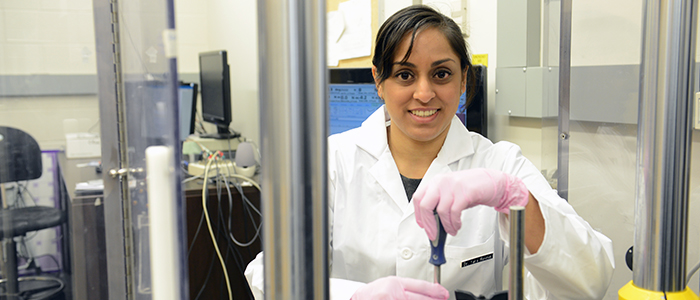Miniature research with maximum potential

It’s the little things that make Yara Hosein, PhD, tick.
Under the supervision of Dr. Ali Tassi the postdoctoral fellow is currently applying her engineering background to research being done in Schulich Medicine & Dentistry’s Graduate Orthodontics program that involves looking into miniature screws used during orthodontic treatment.
Her project focuses on the ways in which the design of these miniature screws affect how well they perform as anchorage devices in bone.
“Mini-implants are a recent innovation in orthodontic treatment, but their success as anchorage devices is influenced by their screw design," Hosein said. "Right now we are assessing mini-screws that are already developed, with the goal of improving their design for enhanced stability and skeletal anchorage."
“Right now we are looking at ones that are already developed with the idea that, in the future, we could probably come up with a design that would work even better in that type of environment,” Hosein said.
Originally from Trinidad and Tobago, Hosein had the opportunity to visit Western University when she was a teenager and immediately fell in love with the campus environment. She decided to move to Canada in 2004 to complete her undergraduate degree in Medical Biophysics. After that, she moved straight into her PhD in Biomedical Engineering.
Her PhD research with Cynthia Dunning, PhD, and Dr. Graham King looked into the surface design and material of cemented orthopaedic implants in order to improve their stability and reduce the possibility of clinical failure by mechanical loosening. This postdoctoral project is a nice follow-up, because even though she is working with a different type of implant and different anatomy, she is able to apply the same sort of mechanical and design principles she used throughout her PhD training.
While her research is what keeps her passionate and motivated, Hosein explained it is the mentorship and support Schulich Medicine & Dentistry and Western University have provided that has kept her here all these years.
“I have worked with, and continue to work with some amazing mentors,” she said. “They have been very supportive and helped to foster the passion that I have toward research.”
She also enjoys the collaborative nature of Schulich Medicine & Dentistry, because she has the opportunity to work alongside researchers from a variety of fields.
Interdisciplinary research environments have been key to Hosein’s success — from her graduate studies in Biomedical Engineering to her present work at Schulich Medicine & Dentistry. She is a member of the Collaborative Training Program in Musculoskeletal Health Research, and was funded through the Joint Motion Program (JuMP), a Canadian Institutes of Health Research Training Program in Musculoskeletal Health Research and Leadership.
This vibrant musculoskeletal research environment has been recognized as one of only two clusters of research excellence at Western, and has given Hosein the opportunity to apply her engineering background to solve clinically relevant research questions while working alongside successful researchers from a variety of fields.
Hosein knows for certain that her future involves a life in academia.
“I am hoping at some point to apply for faculty positions, and to continue with this kind of research,” she said. “I would like to stay in the field of implant stability, but also expand into different areas of dental and orthopaedic research."








